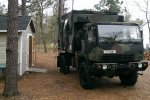kenet3621
Member
- 179
- 4
- 18
- Location
- Blythewood SC
Steel Soldiers now has a few new forums, read more about it at: New Munitions Forums!

I could maybe use that.Here is a photo of what I am calling the "winch instruction plate". Sorry I don't know the official name for it.
View attachment 605457





On some of the early trucks the military applied some sort of sealant type stuff that kind of resembles roll-on bed liner. Mine had it applied to the whole floor. Underneath the driver's side storage box that sealant material is cracked and buckled. I can't tell whether the top layer of sheet metal was that badly damaged from rust, or if it's just that sealant that is all cracked up. Either way I tried to seal all of that up with ultra grey silicone before I put the storage box back in. The cab of my truck had a lot of sand/silt that was very fine, maybe like river silt or something. It took lots of scraping, brushing, vacuuming to get that stuff out. So my thinking is the cab floor probably rusted from water getting into the cab. I would advise anyone who is cleaning up their LMTV to remove the storage box(es), seats, and rubber floor mats to inspect the cab floor.In case anyone else is doing this, the package of Dynamat was 36 sq ft and I ran out. 36 sq ft covered the floors under the seats (completely from front to back including floorboards) and the top surface of the hump. Still wanting to put some pieces on the back wall of the cab, inside the doors, inside the compartments under the side windows, and bottom of the roof. Looks like another 36 sq ft might do that.
Another issue found when cleaning the cab is that the floor is double layer in many places. My truck was full of sand. Obviously sand is a rust magnet so cleaning this 'subfloor' is very important. I am leaving the floor holes open for that purpose. A water hose cleans the void space well.
The original rubber plugs seal the holes in both the layers. I have not found anything like them. Picture attached. Don't laugh but the only thing that resembles that shape is a rubber nipple from a milking machine, and those are too large and too long, but you get the idea
Those "plugs" sure look like duck bill check valves which would let any water drain out, but stop water or air from coming back up into the cab.- -
I am leaving the floor holes open for that purpose. A water hose cleans the void space well.
The original rubber plugs seal the holes in both the layers. I have not found anything like them. Picture attached. Don't laugh but the only thing that resembles that shape is a rubber nipple from a milking machine, and those are too large and too long, but you get the idea
But what activates the "purging"? Unless the valve is pointed down and you physically pinch it now and then:Those "plugs" sure look like duck bill check valves which would let any water drain out, but stop water or air from coming back up into the cab.
You often see bigger rubber valves like this on construction or military equipment air cleaners near the air intake to let accumulated dust out.
Yes, and that's what the water is doing when it sits behind the "duck bill". A drop of water may not allow it to open but if water did build behind it, it would open. The more water behind it, the more open it becomes.But what activates the "purging"? Unless the valve is pointed down and you physically pinch it now and then:
- You otherwise need some kind of positive air pressure or something don't you?


Nice clean installation. Hope it helps the mileage.My latest project was to "fill" the space on the front of the van with a metal sheet. I have been getting 5.61 miles per gallon of fuel. I figured the "hole" in the middle (see BEFORE photo) was catching a lot of air since it had a "roof" over it. I hope I can improve my mileage somewhat by "filling" that space. A piece of 1/8" sheet metal did the trick. Once I get another tank of fuel I should be able to tell if this made any positive difference.
